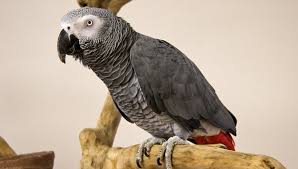
African Grey
Conditions of detention
African Greys require a spacious cage with ample room for climbing and flying short distances. The cage should be equipped with various perches, toys, and opportunities for enrichment. It’s important to place the cage in a social area of the home where the bird can interact with people, as they are highly social animals.
Useful Fact: African Greys need at least 2-3 hours of supervised out-of-cage time daily for exercise and socialization to maintain their mental and physical health.
Nutrition and diet
A balanced diet for African Greys includes high-quality pellets, supplemented with fresh fruits and vegetables, nuts, and seeds. Foods like kale, carrots, apples, and sweet potatoes provide essential vitamins and minerals.
Useful Fact: African Greys require a diet higher in calcium than some other parrots, so providing calcium-rich foods or supplements is important, especially for breeding females.
Health
African Greys are generally healthy birds but are prone to certain conditions such as feather plucking, respiratory issues, and hypocalcemia (calcium deficiency). Regular veterinary check-ups and monitoring for behavioral changes are important for early detection of health problems.
Useful Fact: Ensuring they receive sufficient UV light, either from natural sunlight or UV lamps, can help prevent calcium deficiency and support overall health.
Grooming and care
Regular grooming includes nail trimming and occasional misting or bathing to maintain feather health. African Greys may enjoy bathing in a shallow dish or being misted with water.
Useful Fact: African Greys have powder-down feathers that create a fine dust, so regular cleaning of the cage and surrounding area is important to maintain hygiene.
Education and training
African Greys are highly intelligent and benefit from training sessions that provide mental stimulation. Positive reinforcement techniques work best, and they can learn to perform tricks, solve puzzles, and mimic sounds.
Useful Fact: Consistent training sessions that are short (5-10 minutes) and frequent are more effective and help reinforce learning and good behavior.
Toys and entertainment
Toys are essential for keeping African Greys mentally stimulated. They enjoy a variety of toys, including puzzle toys, foraging toys, and toys that encourage chewing and manipulation.
Useful Fact: Rotate toys regularly to keep your African Grey engaged and to prevent boredom, which can lead to behavioral problems like feather plucking.
Safety
Ensure the living environment is free from hazards such as toxic plants, fumes from non-stick cookware, and small objects that could be ingested. The cage should be secure with appropriate bar spacing to prevent escape.
Useful Fact: African Greys are curious and may chew on electrical cords, so keep cords out of reach to prevent accidents.
Accessories
Essential accessories include sturdy perches, food and water dishes, and a variety of toys. Natural wood perches of varying diameters are beneficial for foot health.
Useful Fact: Avoid using galvanized metal for perches or cage parts, as zinc can be toxic to birds if ingested.
Socialization
African Greys require significant social interaction to thrive. They can form strong bonds with their human companions and may become lonely or depressed if left alone for extended periods.
Useful Fact: Spending quality time with your African Grey daily, including talking and playing, helps meet their social needs and strengthens your bond.
Travel and Transportation
When traveling, use a secure and well-ventilated travel cage. Acclimate your African Grey to the travel carrier before trips to reduce stress.
Useful Fact: Cover the travel cage with a light cloth during transport to minimize stress and provide a sense of security.
Behavior and psychology
African Greys are intelligent and can exhibit complex behaviors. Understanding their body language and vocalizations is crucial for effective communication and care.
Useful Fact: A content African Grey will often engage in playful vocalizations and exhibit relaxed body language, while an anxious bird may display fluffed feathers or repetitive behaviors.
Legal aspects
In some areas, owning an African Grey may require permits or have specific regulations. It is important to ensure that any African Greys purchased are from reputable breeders and not taken from the wild, as they are protected under international wildlife trade agreements.
Useful Fact: The Convention on International Trade in Endangered Species (CITES) lists African Greys, so it’s crucial to be aware of and comply with regulations regarding their ownership and trade.


